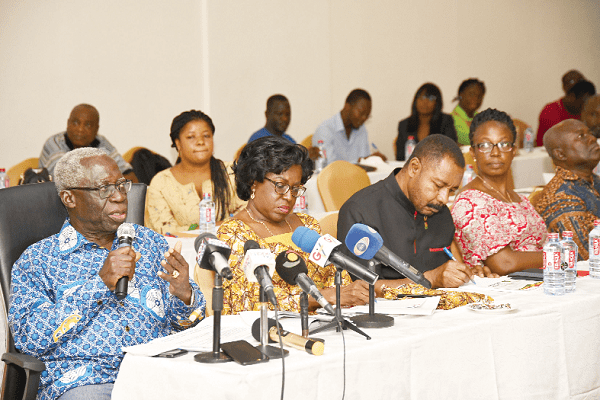
Empower Ghanaians to achieve Ghana Beyond Aid agenda – CSOs tell govt
Some civil society organisations (CSOs) have called on the government to empower Ghanaians to be in control of the country’s natural resources to help achieve the Ghana Beyond Aid vision.
The CSOs said once the exploitation of natural resources such as oil, gold and timber continued to remain in the hands of foreigners, the aspiration to generate sustainable domestic revenue from those resources to develop the country would be an illusion.
In line with their call, they urged the government to commit adequate resources to boost not only science, technology, engineering and mathematics but also technical education to equip Ghanaians with the requisite competence.
“We should jealously guard our natural resources, and whenever we enter into agreements with foreigners, we must make sure that we protect what is ours and not sell them out,” they stated.
Speakers
Representatives of the CSOs, who also called for a change in the mind-set of Ghanaians, expressed the concerns at a consultative meeting on the Ghana Beyond Aid Charter and Strategy Document in Accra last Friday, September 6.
They included the Executive Director of the Lands Resource Management Centre, Mr Mark Kakraba-Ampeh; a past President of the Ghana Institution of Engineering, Dr Kwame Boakye, and the Executive Director of the Ghana Integrity Initiative (GII), Mrs Linda Ofori-Kwafo.
The others are a Senior Research Fellow of the Institute of Fiscal Studies, Dr Said Boakye; the Secretary of the Ghana Institute of Architects, Mr Augustine Richardson; the Executive Director of the Peasant Farmers Association of Ghana, Ms Victoria Adongo, and the Communications Officer of A. Rocha Ghana, Mrs Grace Sogbey.
The meeting was meant to elicit the input of civil society into the 10-point agenda of the Ghana Beyond Aid Charter and Strategy Document prior to its presentation to Parliament.
Ownership
Making an input, Mr Kakraba-Ampeh noted that while Ghana had adequate natural resources that could be leveraged to create wealth to support national development, the continued control of those resources by foreigners did not serve the interest of Ghana.
“There must be a deliberate focus on how our natural resources are exploited, since the ownership of these resources is key to our development,” he stated.
Future generations
Dr Boakye said if Ghanaians failed to control their own natural resources, no effort to develop the country would materialise.
He reminded Ghanaians that the natural resources were not for only the present generation but also future generations, hence the need for conscious efforts to be made to stop foreigners from being in charge of those resources.
“If we give away our natural resources, we are denying our future generations the benefits of those resources,” he stated, and called for a partnership that would help Ghana gain major dominance over its resources.
For his part, Mr Richardson said the dependency on foreigners to run vital aspects of the economy should be reversed.
He stressed the need not only for Ghanaians to be in control of their resources but also actively engage engineers and other professionals from all backgrounds to be on the Ghana Beyond Aid Council to offer the right advice for national development.
Dr Boakye also said even though there were various ambitious growth targets in the Ghana Beyond Aid document, “there are no strategic targets”.
Judging from the history of this country, right from the era of Dr Kwame Nkrumah, there had always been nice visions on paper but the implementation had been lacking, he said.
“Policy instability is the main destroyer of our development, and for the Ghana Beyond Aid policy to become a national one, it must be owned by all Ghanaians, so that if this government leaves office, the vision will not be in vain,” he stated.
Ms Adongo
Speaking on behalf of peasant farmers, Ms Adongo urged the government to pay greater attention to sustainable agriculture to boost food production and security.
The government, she said, spent a chunk of the national budget subsidising fertiliser, yet that input was often smuggled outside the country, at the expense of local farmers.
“We must, therefore, think through ways to spend much on organic fertiliser which can be produced locally,” she stated.
Fighting corruption
Mrs Ofori-Kwafo said while the government had demonstrated sufficient commitment to free Ghana from all forms of corruption, “we should ensure that those who are corrupt are sanctioned”.
“If we enforce the law, we close the opportunities for people to be corrupt at all levels in society,” she stated.
Mrs Sogbey, for her part, said one of the pillars of the draft document called for sustainable access to water for all Ghanaians.
Painting a picture of the damage the mining of bauxite in the Atiwa Forest could cause to water sources and the rich biodiversity, she appealed to the government to look elsewhere to mine bauxite to preserve the forest.
“After all is done, it is these natural resources that we the youth of today and future leaders can look at and call ours,” she said.
Revisiting mining laws
Responding to the concerns of the speakers, the Senior Minister, Mr Yaw Osafo-Maafo, recounted how Ghana had failed to reap meaningful gains from the mining of its natural resources over the years.
He cited the appalling under-development in Obuasi and Tarkwa, two mining towns in the Ashanti and the Western regions, respectively.
To address such challenges, he said, the Ghana Beyond Aid Document placed much emphasis on Ghanaian participation and ownership of the country’s natural resources.
“We have to revisit some of our laws which deal with our natural resources,” he said, adding that the government would do all within its power to minimise corruption and increase domestic revenue to implement the vision.
